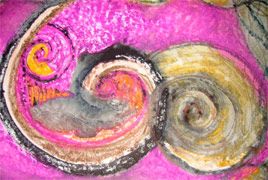The term "ergon" comes from the Greek and means "work", which also means working in the sense of creative activity. Occupational therapy is an action- and expression-oriented form of therapy in which craft/creative techniques (clay, wood, textiles, painting, etc.) serve as a medium to maintain or regain the ability to act, to promote communication skills and realistic self-assessment and to train basic work skills. The focus is not on the product, but on the process of trying to achieve a self-imposed goal or a goal chosen by the group. Based on this background, occupational therapy offers a range of activities with different focal points through creative, manual and practical activities.
Occupational therapy at the psychiatric clinic
Contact
Occupational Therapy Team
frontend.sr-only_#{element.icon}: +49 7071 29-84880
Team Café Hölderlin
frontend.sr-only_#{element.icon}: +49 7071 29-86135
General information
Individual therapy
It is often the case that patients are not yet able to get involved in a group setting due to their illness. In this case, individual therapy offers the possibility to establish contact, to promote motivation and to specifically address fears and insecurities.
Base Group
The basic group is the "first contact" with occupational therapy. This group is a ward-related occupational therapy in which the patients are introduced to theme-related (more or less structured and depending on the clinical picture oriented) expression-centered tasks.
Work group
For patients who work persistently and can tolerate a larger group. Work groups with the materials wood, textile, clay and paper/cardboard are offered.
Depending on the objective, the different materials can be used. While wood, textile and paper/cardboard offer more structuring activities, there are greater possibilities for creative development in the area of clay. Patients in the work group have the opportunity to work on a piece of work for a longer period of time. Here, an increase in the degree of difficulty is provided and a field of practice tailored to the needs of the patient is offered.
Household Training
The everyday tasks of life, from shopping to cooking to eating together and cleaning up, can be practiced here in a familiar setting. It is not only about learning new dishes, but also about the ability to contribute to the team, to take personal responsibility, but also to coordinate with the other group members. In the process, enjoyment and social togetherness are to be awakened.
Baking Group
In this shorter unit, older and weaker patients (just like household training) can try out old and new baking recipes together and thus be reintroduced to practical life activities in a pleasurable way.
Intensive group
The intensive group is for patients who cannot be included in the basic group due to their symptoms. In this group, the focus is on basic-oriented work, such as the use of cognitive resources, for example, the long-term memory in the form of familiar songs, pictures and texts.
Design therapy / Clinical art therapy

In the protected framework of a therapeutic accompaniment, various possibilities in dealing with colour and other materials can be tried out. Beyond the pressure to perform and competition, it becomes possible to find one's own forms of expression and to discover healing potentials that often lie fallow in everyday life. Design becomes the vehicle of expression of the patient's inner psychological world.
Design therapy is ultimately about change, which is possible by stimulating imagination, creativity and a willingness to experiment.
In this way, new ways and perspectives can be reflected upon. These experiential dimensions can be of help in coping with an illness or crisis.
Open occupational therapy
On Saturday mornings there is an open offer for patients who are in the clinic on weekends, where they can work independently with creative media (various painting and drawing techniques or soapstone).
Café Hölderlin

Café Hölderlin is an occupational therapy service at the clinic for inpatients, day patients and outpatients.
Here, patients can train skills and abilities, learn to structure their daily lives, build up and/or regain social skills, and practice endurance and resilience, including in stressful situations.
Occupational therapy and supported work offers open up the possibility for mentally ill people to improve their condition by means of practical exercises and thus to strengthen existing resources and self-initiative. The critical examination of one's own work and approach is helpful in achieving a realistic self-assessment of one's own possibilities.
Outpatient group
After discharge, patients have the opportunity to participate in the outpatient group once a week with a prescription from a psychiatrist in private practice or their family doctor. The further connection to the clinic with a weekly appointment often facilitates the re-entry into everyday life and contributes to the general stabilization.
Certificates and Associations

Focus: Top National Hospital 2025

Stern: Germany's Outstanding Employers in Nursing 24/25

Quality partnership with the PKV

Family as a success factor

Pension provision for the public sector





